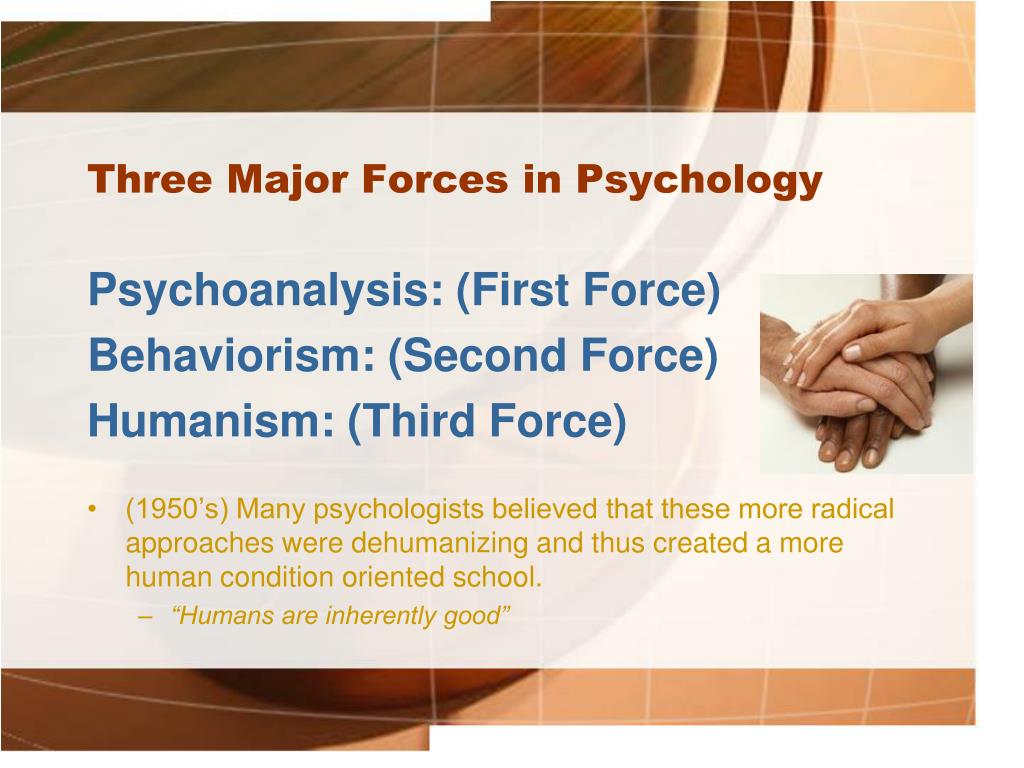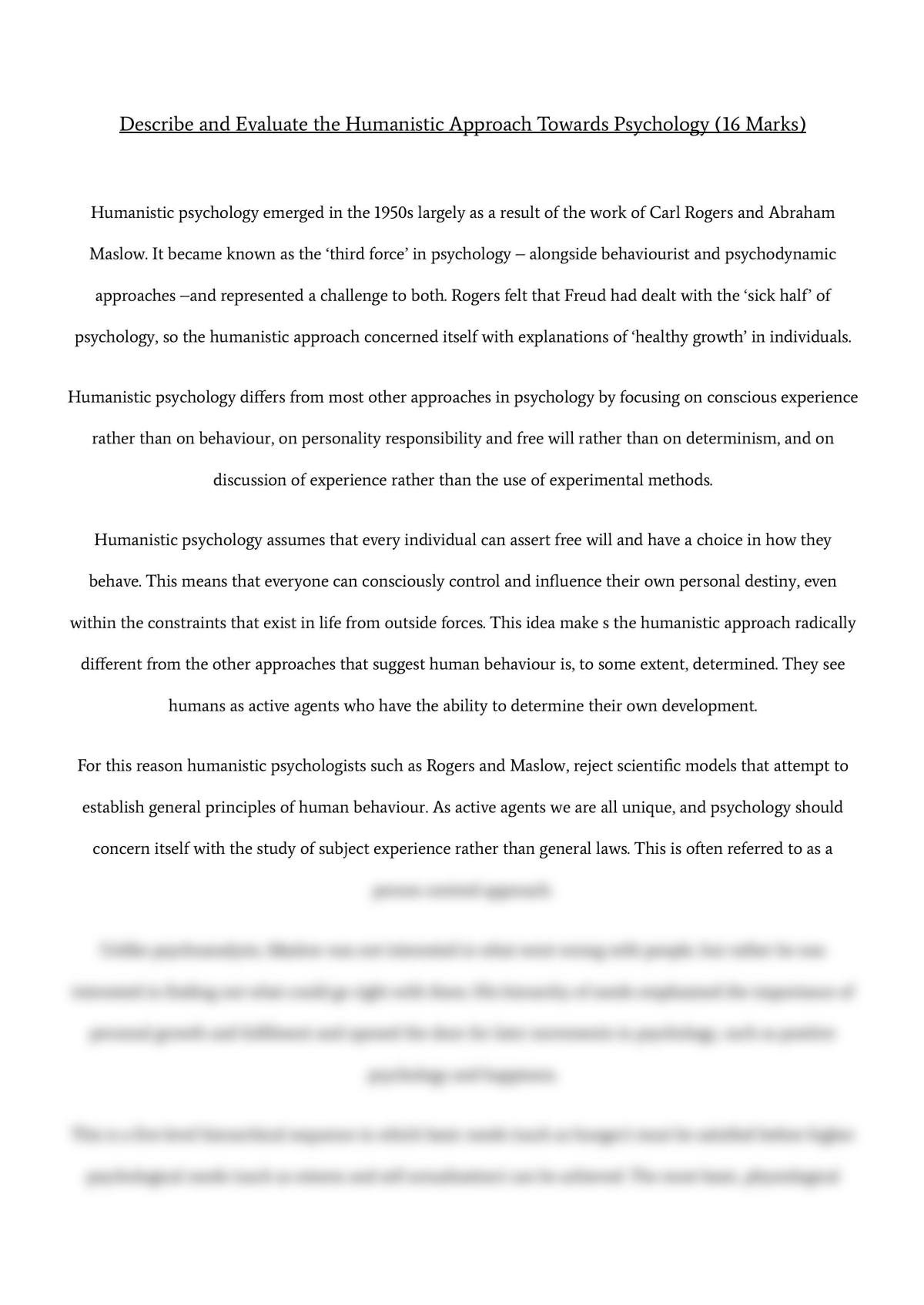The third force in psychology refers to a movement that emerged in the mid-20th century as a response to the dominant paradigms of psychology at the time, which were behaviorism and psychoanalysis. The third force movement sought to provide an alternative approach to understanding and treating mental health issues that was more holistic, humanistic, and culturally sensitive.
Behaviorism, which had dominated psychology since the 1920s, emphasized the study of observable behavior and the use of conditioning and reinforcement to shape behavior. While behaviorism was successful in explaining and predicting certain types of behavior, it was criticized for its narrow focus on overt behavior and its lack of consideration for internal mental states and processes.
Psychoanalysis, on the other hand, focused on the unconscious mind and the role of past experiences and conflicts in shaping behavior and personality. While psychoanalysis had a significant influence on the field of psychology and helped to shed light on the complexity of the human psyche, it was also criticized for its reliance on subjective interpretation and its lack of empirical support.
The third force movement sought to address these limitations by advocating for a more holistic approach to understanding and treating mental health issues. Proponents of the third force argued that psychology should not just focus on behavior or unconscious processes, but also on the individual's subjective experience and the cultural and social contexts in which they live.
One key figure in the third force movement was Carl Rogers, who developed the concept of person-centered therapy. Rogers believed that individuals have an innate capacity for growth and self-actualization, and that the therapist's role is to facilitate this process by creating a safe and supportive environment where the client can explore their feelings and thoughts without judgment.
Another important contributor to the third force was Abraham Maslow, who developed the theory of self-actualization, which emphasizes the importance of meeting basic needs and achieving personal growth and fulfillment. Maslow argued that individuals have a hierarchy of needs that must be met in order for them to reach their full potential, and that the role of psychology is to help individuals achieve self-actualization by addressing these needs.
The third force movement also placed a strong emphasis on cultural sensitivity and the importance of understanding the individual within the context of their culture. This included a recognition of the importance of diversity and the need for psychology to be inclusive and responsive to the needs of different cultural groups.
Overall, the third force in psychology represented a significant shift in the field towards a more holistic, humanistic, and culturally sensitive approach to understanding and treating mental health issues. While the third force movement has not completely replaced the earlier paradigms of behaviorism and psychoanalysis, it has had a significant influence on the field and continues to shape the way that psychologists approach mental health treatment.
Psychology Chapter 11

Stengel E 1953 , Sigmund Freud on Aphasia 1891 3. . Burrhus Frederic Skinner, for example, demonstrated how animals can learn by reinforcement with his invention of the operant conditioning chamber colloquially known as a 'Skinner box '. They would feel that they were being understood and that there was someone going through their thought processes with them. Humanistic psychology is a perspective that emphasizes looking at the whole individual and stresses concepts such as free will, self-efficacy, and self-actualization. What made Third force psychology different from most other types of psychology? This was a reaction to the shortcomings as they saw them of behaviorism and psychoanalysis to deal fully with the human condition. In the relatively recent age of science, each dimension has inspired one of three major movements in the field of psychology — Psychoanalysis, Behaviorism, and Humanistic Psychology.
May the 3rd Force Be With You

According to recent studies, 'Posttraumatic Stress Disorder is a common sequella of severe or chronic maltreatment of. What he meant by this is people are constantly being motivated by one force or another and have the potential for psychological growth. He argued that much of our behavior is motivated by the unconscious, a part of the personality that contains the memories, knowledge, beliefs, feelings, urges, drives, and instincts of which the individual is not aware. What are the 5 forces of psychology? Rather, it is seems that humans are free to choose their own type of existence. What is the third force in psychology? This box reinforced lever pressing behaviour. The third force in psychology refers to the theories of Maslow, Allport, Rogers and May.
Discuss the third force in psychology and how it differs from the first and second blog.sigma-systems.com and discuss the following terms: congruence, empathetic listening, peak experience, and the Jonah Complex.

This was a reaction to the shortcomings as they saw them of behaviorism and psychoanalysis to deal fully with the human condition. Finally, self-actualisation is characterised by morality, creativity, spontaneity, lack of prejudice, acceptance of facts and problem solving. A positive reinforcement means giving a stimuli and a negative reinforcement is taking away a stimuli, along with punishment. The theories main beliefs are that all people have a hierarchy of needs that must be met before the higher ones will be met. It is a call to service or responsibility that promotes the understanding of one-self, making constructive personal choices, and caring and supporting other groups. In conclusion, humanistic psychology has thus been extremely useful as an additional way to look at the world of psychology.
What is the third force in psychology?

However, one of the more well-known learning theorists in modern times is B. Skinner's the father of Operant Conditioning hypothetical establishments are the aftereffect of Skinner's studies on Thorndike's Law of Effect 1905. Define and discuss the following terms: congruence, empathetic listening, peak experience, and the Jonah Complex. He used a device called a Skinner box this box contains a lever, when pressed it releases a food pellet into the box reinforcing lever pressing behaviour. What is a major factor for personality according to the humanistic approach? There are five steps. Freud attempted to demonstrate how these unconscious thoughts and desires could surface through parapraxis 3 , which are now known as Freudian slips, and studied the mind using techniques such as free association and dream interpretation. In addition to this, the third-force movement rejects the idea of.






